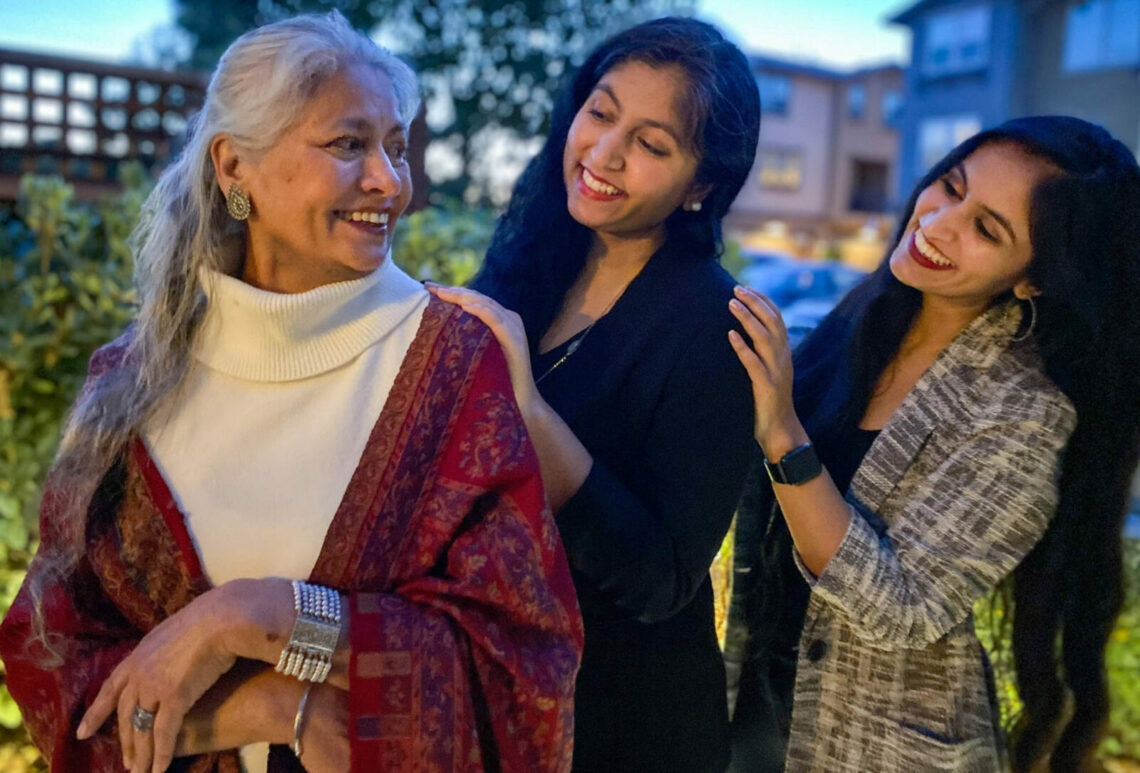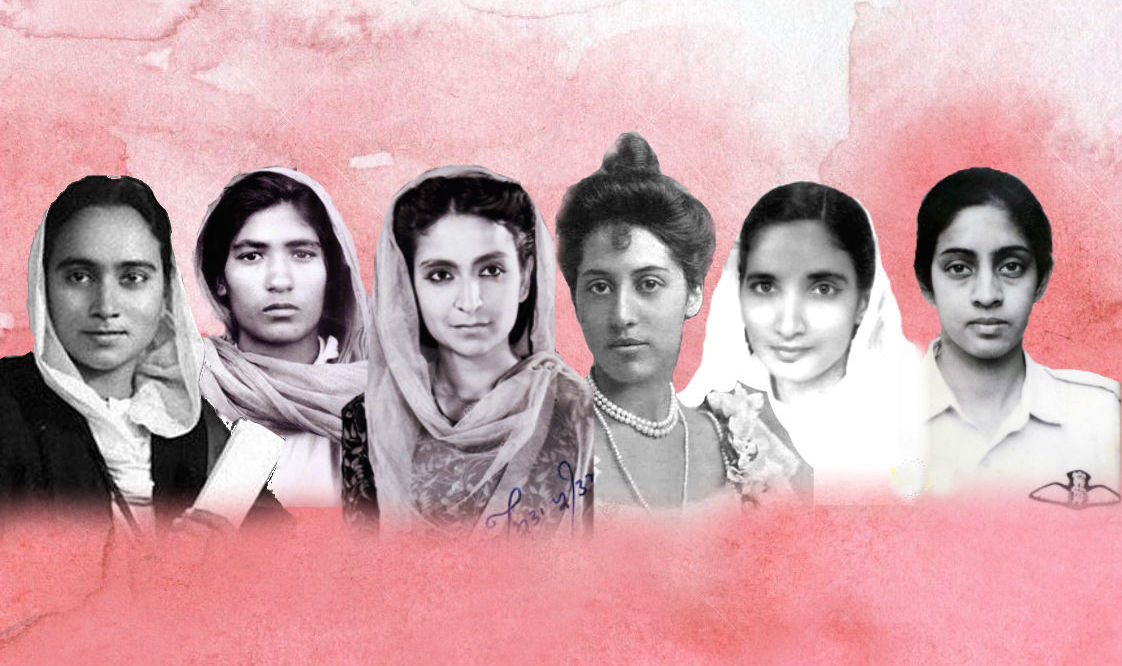By Sukhmani Kaur
Traditions of Silence: A Story of Trauma, Toxicity and Female Conditioning
The following article is a reflection on the author’s childhood, the abuse her father inflicted on her family, how Sikhi was her rock, and how she was able to move forward and heal. This is part one of a two part series. Be sure to read part two, “There’s No Word for Divorce in Punjabi”.
Trigger warning: Domestic violence and assault.
Flashbacks of Trauma
So, you want to talk about trauma. It’s the thing that happens to you that you’re supposed to get over and move on from. Really, it’s the thing that you go through and have the capacity to heal from, but never the ability to truly forget. It’s the flashbacks of seeing your father getting hauled away in handcuffs by two police officers. Of your mother being pushed from wall to wall struggling to release herself from his grasp. It’s the voice of your 5 year old self playing back in your head on a loop yelling “Stop! Please, stop!” It’s your childhood being snatched away as you watch your mother being yanked back from the phone by her hair as she scrambles to dial 3 numbers and projects her croaking voice just enough to call for help to the emergency line operator. It’s taking 15 years to be able to eat Cheerios again because after you and your mother cried for hours that evening, it’s the first thing either of you ate since early that morning. It’s 20 years later still not being able to reflect on that day without feeling like that scared 5 year old all over again.
Staying Silent
But, really, trauma is the thing you’re not allowed to be affected by. My mother and I finally fell asleep after doing Kirtan Sohila together that night and the first thing we did the next day was go to Gurdwara. Our regular route to Gurdwara meant passing by the police station, which normally wasn’t even an afterthought but became all too prominent of a landmark that Sunday. My mother put on a brave face and held back her tears as I asked her how long Papa would be in jail, what it was like in there, or what was going to happen next. She mustered her best “I don’t know, but it’ll all be okay, don’t worry.” Shortly before arriving to Gurdwara, though, she prepped me for our interactions. No one needed to know about what had happened at home, this would stay between us. We had only recently moved to California at that point so we had our sangat, but we wouldn’t want to jeopardize that by sharing details of our home struggles with anyone.
As an adult, I realize quite how toxic these first nuggets of female conditioning were before we entered the Gurdwara that day. It wasn’t my mum’s fault, though. That’s what she was taught, too. It’s the woman’s job to keep the family together – in her home and in the eyes of the community. If a home falls apart for any reason, or experiences any form of turbulence, it’s correlated to the inability of a woman to care for her home – a direct result of her neglect to her responsibility to her family.
It’s the very reason why my mother dropped the charges and brought him back that Sunday night, with no repercussions. It’s also the same reason that it wasn’t an isolated incident.
A Turbulent Childhood
Trauma from abuse doesn’t just come from an isolated incident. The environment I grew up in always had an inherent tension. For most of our lives, my sister and I had trained ourselves to always be prepared for the other shoe to drop – happy moments were always fleeting. Loud voices, constant arguments and slammed doors made up the soundtrack of about 80% of my childhood. The other 20% was my mum being the loudest cheerleader at the sidelines of our soccer games, teaching us to laugh about silly things, and her never ending supply of inspirational speeches encouraging us to be the best we can be; to rise above the challenges of our situation, to always fight to be better. It’s what encouraged me to think that our home situation could be solved – the beginnings of my personality developing to be the family fixer. My sister and I alternated attempts to mediate our family for years, but the optimist in me held on longer, as I’d drag the four of us to the living room every so often to try and resolve our challenges.
But as I got older, I began to see clearer through the empty promises, bribery and lies that came out of his mouth every time he spoke to me. The physical altercations continued in a more subdued manner over the years, but the emotional abuse ran deeper, louder, and longer every day. And then it happened again.
When Violence Escalates
Trauma is hard to heal from if it’s repeatedly inflicted. This time he directed his anger to a new target. I was in elementary school, and my sister was in high school. We had only one computer in the house and she needed it for a school assignment. But he was unemployed, so the computer room was practically where he lived when he wasn’t sleeping. My sister lost her patience after asking twice and finally yelled at him to get off because while he was wasting time online, she had something of importance to get done. They both began to yell at each other as he angrily got up and began walking to her, ushering her out of the room and into the hallway. I had walked in right behind my sister and my anxiety began to rise as we stumbled back out. In a blur of a few moments of their argument getting louder and louder, I found myself with the same lines again “Stop, please stop!” as his hands were suddenly around my sister’s neck, pushing her against the wall as my mum came out from the kitchen frozen momentarily in horror to find what she did, until she ran over desperately trying to peel him off of her.
I blocked out the memory of what happened the rest of that day, along with the rest of most of my childhood in that home with that man. But I do remember asking my mother later that night if Papa was going to hurt me, too, like he did to her and Bhain Ji (sister). I remember the fear of not knowing when his anger would send him flying off the walls again, and wondering if one of us would end up in the hospital, or worse, because of it.
Log Ki Kehnge? What Will People Say?
I struggled to share this story. Partially, because the trauma is painful to revisit. Partially, because I felt like it wasn’t my story to tell – even though, it’s in fact the reality I lived. I felt a sense of sharam on behalf of myself, my mother and my sister. I couldn’t possibly expose this dark part of my family’s history. Cue the infamous, “log ki kehnge?” (“what will people say?”) sentiment. But I struggled to share this story mostly, because my Sangat is still trained to blame the survivor.
My Sikhi – My Rock
My Sikhi has always been my rock throughout all of the chaos that was my life growing up. We had a small Baba Ji da Kamra in the condo I grew up in – it was my safe space. I never realized quite how much of a sanctuary it was for me until I reflected on it as an adult. Anytime I heard arguing, I went in and sat there. Sometimes for hours. Some nights I would even sleep there, with the comfort in my heart that no one would dare hurt me in front of my Guru. While the average American child wrote letters to Santa, I wrote letters and emails to God – sometimes angry ones, sometimes thankful ones, sometimes wishful ones. My ardaas never went unheard, even as I would sometimes begin to have doubts. Sikhi was my anchor amid the hurricane that was my home growing up.
But what I struggled with the most in my Sikhi, and still do, is with my Sangat. The Sangat that my Guru teaches me is supposed to treat and be treated equally, justly, and with love. But that Sangat, in practice, was the same Sangat I was having to shield my biggest struggles from, rather than reaching out to for support. The sense of sharam that it would cause my family was too high a price.
Why Did I Feel Shame?
But then I started to ask myself a different question – why did I feel this sense of sharam? I didn’t do anything wrong, neither did my mother. But for some reason even as a 5 year old, I hesitated before telling the officer what had happened that day, because of a sense of needing to “protect my family’s reputation”. And now, 20 years later, I felt a need to protect my mother’s reputation…for what? For being a survivor? Something didn’t add up. What kind of backward cultural learning had been so deeply ingrained in me and generations of Punjabi/Sikh women that even as a 5 year old, I hesitated to expose something I knew was wrong…for the sake of some sort of role I felt I had to protect the family reputation?
My Sikhi tells me that Kaurs have the same place in society and Sangat as Singhs. My Guru tells me that I am an equal to my male counterpart. But at every turn, my gender is treated as a second class citizen. My father committed horrendous acts and behaviors, but my mother is culturally blamed for not sticking through it? Why?
Gender Roles
Our parents’ generation was taught to abide by and be prepared for very clear gender roles. In a highly simplified manner – the man was perceived as the breadwinner and the woman, the homemaker. But the woman is tasked with quite a lot more than that suggests. Women were tasked with and judged for the quality of their cooking, cleaning, child-rearing, as well as their ways of walking, talking, eating, and dressing. But they were also tasked with keeping their families whole and happy. Despite the lack of value for women in our culture and society, they were tasked with holding an immense weight of responsibilities to their families and communities that were followed by heavy scrutiny.
Not much has changed, except that now on top of it all, women are also expected to be breadwinners in many communities. And when anything falls through the cracks, big or small, the first finger is pointed towards the woman of the home.
My Sikhi tells me that Kaurs have the same place in society and Sangat as Singhs. My Guru tells me that I am an equal to my male counterpart. But at every turn, I feel like I see accountability and expectations held heavier for women, while privileges and the benefit of the doubt is more heavily extended to male counterparts. My father committed horrendous acts and behaviors, but my mother would be considered to be at fault. Why? The judgment and blind victim blaming in our community still leaves me dumbfounded.
A Generational Change?
I hoped that this was a generational issue that would end as younger generations expanded their values with western influence and its empowerment of pursuing justice embedded into our way of life and learning. But it’s become a mere facade. We live in the generation of the #metoo movement, the social media generation – where almost all of my Sangat posts about their support for domestic violence victims, the right to divorce, how not to victim blame, and spreading general awareness on their social media accounts…but no one wants to hear the true answer when they ask, “How are you?” The same Sangat that bullied and whispered about the kids that didn’t come from the wealthiest or most powerful family in the community, sometimes still do, are the same ones posting stories every day of falsified empathy toward others.
Domestic abuse is considered to be a chronic and/or complex trauma – one that my mother, sister and I struggled with for much longer than we should have due to a feeling of isolation despite the physical existence of Sangat. My mum had no family in the States, and very few people she felt she could truly lean on. The stigma of divorce and a woman’s responsibility kept her hanging on to her marriage for dear life, hoping that one day if she just worked hard enough, she could resolve all of the problems in her home. But he showed no desire to change, and ultimately my mum finally took a brave step forward for herself and her daughters and we moved out my Sophomore year of high school. That decision was just the beginning of a series of challenges to come, but I’m thankful to say that my mum, sister, and I are in a safer, happier, and more stable place today because of her strength to take the first step.
Moving Forward
So, let’s actually talk about trauma. Let us take the first step in being the Sangat that my family needed 20 years ago. Sangat is not simply created by the physical joining of crowds at Gurdwaras. The weight of trauma from domestic abuse can take a lifetime to sort through, manage and move on from. But we can be the ones to help carry the load and make that journey just a little bit easier for our Sangat by becoming a force of support rather than of judgment. There are more families struggling with domestic abuse behind closed doors every day, and it’s unfortunately heavily prevalent in our Punjabi communities. As a now trained domestic violence victim advocate, a survivor of a DV home, and a humble member of our Sikh Panth – I ask you to show up for your Sangat. Take the time to educate yourself on the triggers and signs of a DV victim, learn how to support them in your local community, and create a safe space for your Sangat to reach out to if they need it. If you, a family member, or a friend are struggling with any form of abuse – know that you are not alone. I pledge to keep my heart and mind open and available for any of those who may need someone to lean on. I hope many more Sangataan will do the same.
This is part one of a two part series. Be sure to read part two, “There’s No Word for Divorce in Punjabi”.
About Sukhmani Kaur Kocher

Sukhmani Kaur Kocher is a Management Consultant at Accenture by day, where she focuses on transforming customer journeys for her client experience design. Outside of her day job, she owns her own clean ingredient candle company, Scents by Sukhs, and directs a volunteer organization that she founded in 2018, Bay Area Youth Seva Group. Sukhmani loves to destress with music, writing, cooking and embarking on new travel adventures. She’s a passionate advocate for humanitarian and social justice issues, volunteering, and keeping the values of Sikhi alive.
Statistics:
- 1 in 4 Sikh women and 1 in 10 Sikh men report facing family violence at some point in their lives.
- 12% of Sikhs in the US have ever heard of someone talk about domestic violence at Gurdwara.
- 1 in 3 Sikh females in the US sought help after experiencing domestic violence.
- 25% of Sikh domestic violence survivors report having had thoughts of harming themselves – compared to 6% of Sikhs who have not experienced domestic violence.
Resources:
The Sikh Family Center’s promotes the health and well-being of Sikhs across the U.S., with a special focus on ending gender-based violence. SFC integrates intervention, prevention, and education services, with particular attention to community-based solutions, grassroots empowerment, cultural tradition, and immigration experience.
The Sikh Awareness Society (SAS) is a community based, non-profit organization formed in 1998 by the British Sikh community who felt an urgent need to raise awareness of sexual abuse, violence and grooming of young Sikhs. Area Served: UK.
The Sikh Helpline strives to provide support for Sikhs who face racism, family problems, school problems, immigration issues, employment challenges. Area Served: Australia.
Karma Nirvana – is an organization supporting all victims of honor based abuse and forced marriage. Jasvinder Sanghera, who was born into a Sikh family set up the organization to speak out against honor killings. Area Served: UK.
Raksha is a non-profit serving the South Asian community since 1995. Raksha’s mission is to promote a stronger and healthier South Asian community through confidential support services, education, and advocacy.
Apna Ghar provides holistic services and conducts advocacy across immigrant communities to end gender violence.
Daya serves south Asian women, children and men in the Houston area who have been the victims of domestic violence or sexual assault.
Sakhi for South Asian Women exists to represent the South Asian diaspora in a survivor-led movement for gender-justice and to honor the collective and inherent power of all survivors of violence.
Manavi has a mission to end all forms of violence against women specifically addressing the unmet needs of South Asian women affected by violence.





No Comments